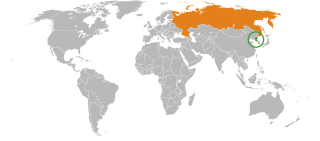Economic sanctions or embargoes are commercial and financial penalties applied by states or institutions against states, groups, or individuals. Economic sanctions are a form of coercion that attempts to get an actor to change its behavior through disruption in economic exchange. Sanctions can be intended to compel or deterrence.

United Nations Security Council Resolution 1695, adopted unanimously on July 15, 2006, banned the selling of material that would further the ability of the Democratic People's Republic of Korea to bolster its ballistic missiles programme. Resolution 1695 was adopted after recalling resolutions 825 (1993) and 1540 (2004) concerning North Korea and the non-proliferation of weapons of mass destruction, respectively.

United Nations Security Council Resolution 1718 was adopted unanimously by the United Nations Security Council on October 14, 2006. The resolution, passed under Chapter VII, Article 41, of the UN Charter, imposes a series of economic and commercial sanctions on the Democratic People's Republic of Korea in the aftermath of that nation's claimed nuclear test of October 9, 2006.

United Nations Security Council Resolution 1696, adopted on July 31, 2006, after expressing concern at the intentions of the nuclear programme of Iran, the Council demanded that Iran halt its uranium enrichment programme.

The Soviet Union was the first to recognize North Korea on October 12, 1948, shortly after the proclamation, as the sole legitimate authority in all of Korea. The Soviet Union supported North Korea during the Korean War. North Korea was founded as part of the Communist bloc, and received major Soviet military and political support. The comprehensive personality cult around North Korea's ruling family was heavily influenced by Stalinism. China and the Soviet Union competed for influence in North Korea during the Sino-Soviet split in the 1960s, as North Korea tried to maintain good relations with both countries.

United Nations Security Council Resolution 1874 was adopted unanimously by the United Nations Security Council on 12 June 2009. The resolution, passed under Chapter VII, Article 41, of the UN Charter, imposes further economic and commercial sanctions on the Democratic People's Republic of Korea and encourages UN member states to search North Korean cargo, in the aftermath of an underground nuclear test conducted on 25 May 2009.

United Nations Security Council Resolution 1929, adopted on 9 June 2010, after recalling resolutions 1696 (2006), 1737 (2006), 1747 (2007), 1803 (2008), 1835 (2008) and 1887 (2009) concerning the topics of Iran and non-proliferation, the Council noted that Iran had failed to comply with previous Security Council resolutions concerning its nuclear program and imposed further sanctions on the country.
The Foreign Trade Bank of the Democratic People's Republic of Korea is North Korea's primary foreign exchange bank, and is owned and run by the North Korean government.

United Nations Security Council Resolution 2231 was a 20 July 2015 resolution endorsing the Joint Comprehensive Plan of Action on the nuclear program of Iran. It sets out an inspection process and schedule while also preparing for the removal of United Nations sanctions against Iran. The 15 nations on the Security Council unanimously endorsed the resolution, which had been negotiated by the permanent members of the United Nations Security Council—China, France, Russia, the United Kingdom, and the United States—plus Germany, the European Union, and Iran.
In the year 2016, North Korea conducted two nuclear tests: one in January and the other in September. Additionally, the country conducted several missile tests. As consequence, the United Nations Security Council adopted three resolutions against North Korea.

The United Nations Security Council unanimously adopted Resolution 2270 on March 2, 2016, with approval of all the five permanent members and the ten non-permanent members in response to North Korea’s fourth nuclear test on January 6, 2016, and its launch of a long-range missile carrying what it said was a satellite on February 7, 2016.

On March 4, 2015, the United Nations Security Council unanimously adopted Resolution 2207 on North Korea. The resolution extended the mandate of the Panel of Experts, which supports activities of the ‘1718 Sanctions Committee’, for one year to April 5, 2016.
A number of countries and international bodies have imposed international sanctions against North Korea. Currently, many sanctions are concerned with North Korea's nuclear weapons programme and were imposed after its first nuclear test in 2006.
In the year 2017, North Korea was involved in the 2017 North Korea crisis, along with other events. The country conducted a nuclear test in September, and several missile tests throughout the year. One of these was the country's first successful test of an intercontinental ballistic missile (ICBM), Hwasong-14. Two missiles were launched over Hokkaido in the Japanese archipelago, in August and in September 2017.

The UN Security Council Sanctions Committee on North Korea is a subsidiary body established in 2006 by the UN Security Council's resolution 1718 in response to North Korea's first nuclear test and its other nuclear proliferation efforts.

The United Nations Security Council unanimously adopted Resolution 2371 on August 5, 2017, with approval of all the five permanent members and the ten non-permanent members in response to North Korea’s July 2017 missile tests.

European Union–North Korea relations are the foreign relations between the European Union and the country of North Korea. Bilateral relations between North Korea and the EU date back to the 1990s.

United Nations Security Council Resolution 2397 is a resolution adopted unanimously on 22 December 2017 in response to North Korea's launch of a Hwasong-15 intercontinental ballistic missile on 28 November of that year. The resolution condemned the launch and further tightened sanctions on the country, restricting fuel imports and other trade, as well as the ability of North Korean citizens to work abroad. On 24 December, the North Korean Ministry of Foreign Affairs stated that the resolution constitutes an act of war.












